
A little ego never hurts anyone in Hollywood as long as it doesn’t get out of control. Actors need to sell themselves as the best candidate for every part to convince casting agents and filmmakers that they’re the standout candidates, which came back to haunt Ron Howard when he got too big for his boots.
In his defence, he had every right. Howard was one of America’s most prolific and proven child stars, having amassed an extensive array of credits across film and television well before the end of his teenage years, so it was understandable that he’d assume people would appreciate an unsolicited audition.
He’d spent years on The Andy Griffith Show before landing another plum role opposite Henry Fonda on The Smith Family, but he was left to feast on a massive slice of humble pie when he took it upon himself so show up unnanounced and put himself forward for a part he was confident he could pull off.
Howard definitely deserves points for initiative, even if the execution was embarrassingly lacking. When a script landed on his agent’s desk for a TV movie called The Homecoming: A Christmas Story, something caught his eye. Despite the fact that he hadn’t been invited to read for it, he went along anyway.
As it turned out, there was a reason why. When Howard waltzed into the production offices, introduced himself to everyone, and began explaining why he was ideal for the gig, the only response was awkward silence. After laying out why he should be cast, reality hit home when he was told they already had someone else in mind, which is why he wasn’t offered an audition in the first place.
He didn’t know it then, but it would have been a role that spanned years. The Homecoming was a ratings hit and a Golden Globe-winning and Primetime Emmy-nominated success that opened the door to The Waltons, with Howard attempting to manoeuvre himself into pole position to play John-Boy, which Richard Thomas embodied for seven seasons and three feature-length sequels.
“Unaccustomed as I was to rejection, I nevertheless recognised this brush-off for what it was,” he wrote in his memoir, The Boys. “I said that I understood and thanked them for their time. With my heart pounding and a lump in my throat, I slunk out of the office and trudged back to my car in the off-parking lot, to which I had been relegated as a nonstar.”
Rejection is part and parcel of acting, but bursting into a casting office, demanding an audition for something he hadn’t been asked to audition for, explaining at length why he was the perfect guy to play John-Boy, and then being told there was already an actor lined up is a different level of embarrassment.
Taking it on the chin, Howard acknowledged that “Richard was absolutely deserving of the part and flourished in the show, becoming a TV star.” On the other hand, he found himself “on the precipice of irrelevance.” Happy Days was looming just over the horizon, but he didn’t know that yet, and it was the last time he’d be so brazen when trying to land himself a project.
